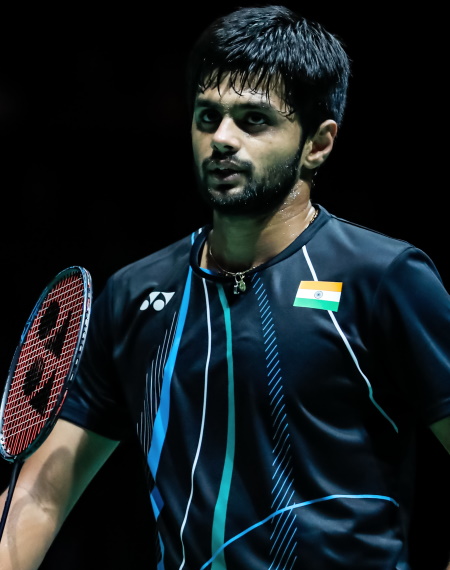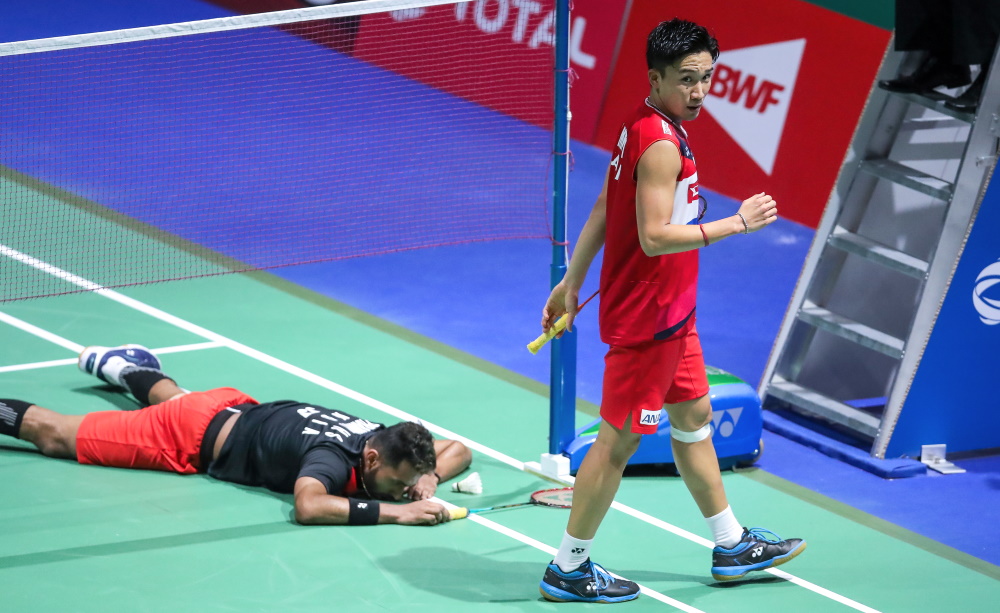What does it mean when a top-15 player in the form of his life admits to feeling ‘blank’ against Kento Momota? What does it mean when such a player struggles with routine shots that he could otherwise play blindfolded?
Was it simply a case of Sai Praneeth having an off-day in his semifinal? Or was there something else – rhetorically speaking, a sort of hypnotic spell – that caused battle-tested and hungry challengers such as himself to feel worn out while facing the guile of the left-hander?
These were the undercurrents in Kento Momota’s startlingly comfortable journey to his second title at the TOTAL BWF World Championships 2019 in Basel last month. The defending champion arrived in Basel with the cloud of his Sudirman Cup final letdown hovering over him; by the end of the week, he had burnished his credentials with a performance that was staggering on many levels.
The title was his with six straight-games victories. Out of the 12 games played, six were won in single digits. And there was only one game – one – in which he lost over 13 points. The final itself would turn out to be perhaps the most lopsided in history – a 21-3 whipping that left most watchers nonplussed. A 21-9 21-3 verdict in a World Championships final?
So what exactly was going on? And what did his victims make of their debacle?
Praneeth, for one, was at a loss for words after his 21-13 21-8 capitulation, just a day after achieving the biggest result of his life, a World Championships medal.
“I was pushing the pace but not getting points, and I was getting mentally tired and I didn’t know exactly what to do. I was attacking, he was taking it.”
Still looking caught in the spell that his opponent seemed to have cast on him, Praneeth went on:
Xem thêm : News | BWF Thomas & Uber Cup Finals
“He plays according to the opponent, he can vary the game whenever he wants to. That is a big plus point for him. He has a lot of patience and a lot of variations. He can read opponents. He has something different from others which makes him tough to beat. I was a bit blank today, there’s not much to say. We will figure it out… someday.”
The only opponent who did give Momota some trouble was HS Prannoy, in the first game of their third-round match. The Indian came from behind to level at 19. That’s as far as he got. Looking back, Prannoy could only muse at the tiny gaps that his opponent had exploited.
“There were a couple of crucial mistakes at 15 and 17 or 19 that could’ve gone either way. Mentally it was tough that I could not close out the first. It was probably running in my mind, during the first 11 points, and probably the game shifted.”
Prannoy zeroes in on Momota’s placement of shots that extends the difficulty for opponents. Forcing opponents to run an extra step or two on every shot might not seem a lot, but over the course of a match, the incremental gains build up to something much bigger.
“There are certain shots that come from a different angle, especially from Lin Dan and Momota. Those kinds of strokes you don’t get to play on an ordinary day. They keep coming and you have to move extra on that and probably that’s where you get tired. There are fewer things that you can counter on those strokes – you need to be either really fast or you need to be even more skillful than him. Someone like me, I have to run and take those, and I have to wait until I get a really good chance.
“I scored a lot of points in the first game with good attacks, and at a couple of junctures, he picked up those crucial ones in the big rallies which would have otherwise gone my way. He didn’t score much with his attack. He was rallying and controlling the shuttle.
“He keeps it down all the time. From the left-handers, you get really tough angles, especially on the crosscourt drops, which you don’t get from a (right-handed) player’s overheads; you have to run one more step, which you (usually) don’t do, as you are generally moving further to your right-hand side on the crosscourt drop. So these are a couple of things which are disturbing because you know it’s coming but you have to run a couple of meters more for that and probably at the end of a 55-minute match, that counts.”
The final was unusual on many counts. Anders Antonsen had also progressed without losing a game – in fact, having got a first-round walkover, he’d played one match less than Momota. His semifinal against Kantaphon Wangchaoren had taken him 48 minutes. But in the final, after standing his ground in the early exchanges, Antonsen slipped into quicksand, winning just six of the last 40 points.
Xem thêm : Korea Open Finals: A Showdown of Korean Women’s Doubles Pairs
Antonsen would say he’d just been too tired to mount a challenge. Even so, his struggle with even routine shots mirrored Praneeth’s. It wasn’t just that Momota was playing well – he was also making them play badly.
“In the beginning, he made some mistakes and I thought I had a chance, but once he got started, he played good quality and I was too tired to do anything,” said Antonsen.
Momota will know that a week such as this is extraordinary even for him; whatever spell he has cast cannot last. That was why, not long after his win, he talked about reinventing his game.
“I cannot stick to my current style, for my opponents will start reading me, so I have to work on other areas,” said Momota. His opponents may well wonder what else he has in store.
FAQs
Q: What tournament did Kento Momota win?
A: Kento Momota won the TOTAL BWF World Championships 2019 in Basel.
Q: How many straight-games victories did Momota achieve?
A: Momota won the title with six straight-games victories.
Q: Did Momota lose a game in the championship?
A: Momota only lost one game throughout the championship.
Q: How did Praneeth feel after his match against Momota?
A: Praneeth felt mentally tired and struggled to find the right approach against Momota.
Q: Why did Prannoy find it difficult to close out the first game against Momota?
A: Prannoy made a few crucial mistakes at crucial points, which affected his mindset and allowed Momota to take control.
Summary
Kento Momota’s dominant performance at the TOTAL BWF World Championships 2019 showcased his skill, patience, and ability to adapt to opponents. Players like Sai Praneeth and HS Prannoy struggled to find answers to Momota’s game, with his placement and angles creating difficulties. Momota’s victory, with six straight-games wins and just one game lost over 13 points, left his opponents astounded. Despite the challenges faced, Momota plans to reinvent his game to continue his success. The championship highlighted Momota’s exceptional talent and sparked curiosity about what else he has in store for future competitions.
Nguồn: https://carnegiecentre.com
Danh mục: Tin tức






